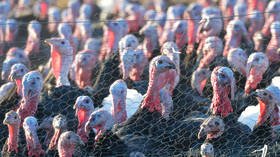‘Stick Grandpa by the window’: Irish immunologist urges festive revelers to mothball family traditions… because, Covid-19

It is possible to celebrate Christmas and Thanksgiving safely, an Irish immunologist has told a skittish public– you just have to cut out all physical contact and socializing, forget hugging, and avoid after-dinner conversation.
Professor Luke O’Neill of Trinity College in Dublin has reassured pandemic-fearing families that they don’t necessarily need to call off their holiday celebrations – they just need to drain the gatherings of all human connection and camaraderie.
Children can hug their grandparents, he ventured during a Tuesday interview with RTÉ, but only “briefly outdoors while wearing a mask.” Overall, he explained, “the less time [spent with Grandma and Grandpa], the better”. When in doubt, “stick Grandpa by the window and have a good breeze blowing through.”
Also on rt.com ‘A sacrifice now could save lives’: Fauci urges Americans to keep Thanksgiving gatherings small as Covid pandemic persistsDinner itself should be a socially-distant affair, O’Neill continued, advising the host to place empty seats between diners and “stagger” the setup across the table to minimize eye contact - er, virus transmission. Even accidental brush-ups against fellow humans should be avoided at all costs, he suggested, telling listeners: “don’t pass the gravy boat.”
The time-honored tradition of gossiping over food prep in the kitchen is also on the chopping block, as O’Neill called for a single designated drudge to “do all the serving to keep numbers down in the kitchen.” Even better, he said, guests should avoid corona-cooties by bringing their own utensils.
And forget spending quality time together before and after the meal. “You can’t be having 10 hours in a stuffy room together playing family games,” the biochemistry professor chided, suggesting relatives should eat and run.
Don’t spend too long in each other’s company.
While some of O’Neill’s advice echoed the pleas of the US Centers for Disease Control, the US agency actually went even further in several areas, urging Americans to not only bring their own utensils but their own food, drinks, plates, and cups. These should be disposable, the CDC added, apparently seeing nothing wrong with countering years of scolding behavioral ‘nudges’ toward eco-friendly practices.
Also on rt.com ‘Greta shaming’ trend in Israel discourages plastic utensils with ‘dystopian’ cut-outs of teen climate activistThe CDC last week urged Americans not to travel for Thanksgiving at all – and if they do travel, to make the celebration as cold (literally and figuratively) and impersonal as possible. The meal should be eaten outside or, better yet, home alone in front of a webcam, in a Zoom chat with fellow isolated family members.
Ireland has been under strict ‘level five’ Covid-19 restrictions for weeks, with the government citing “evidence of a potentially grave situation arising in the weeks ahead” as justification for adopting the rules even as deaths with the virus had leveled out near zero. Under those regulations, social and family gatherings in homes and gardens were banned entirely, while individuals were forbidden from venturing more than five kilometers from their home unless for “essential purposes.”
The draconian restrictions are expected to be slowly phased out in the coming weeks, as Ireland’s infection rate is lower than the UK’s.
Think your friends would be interested? Share this story!











